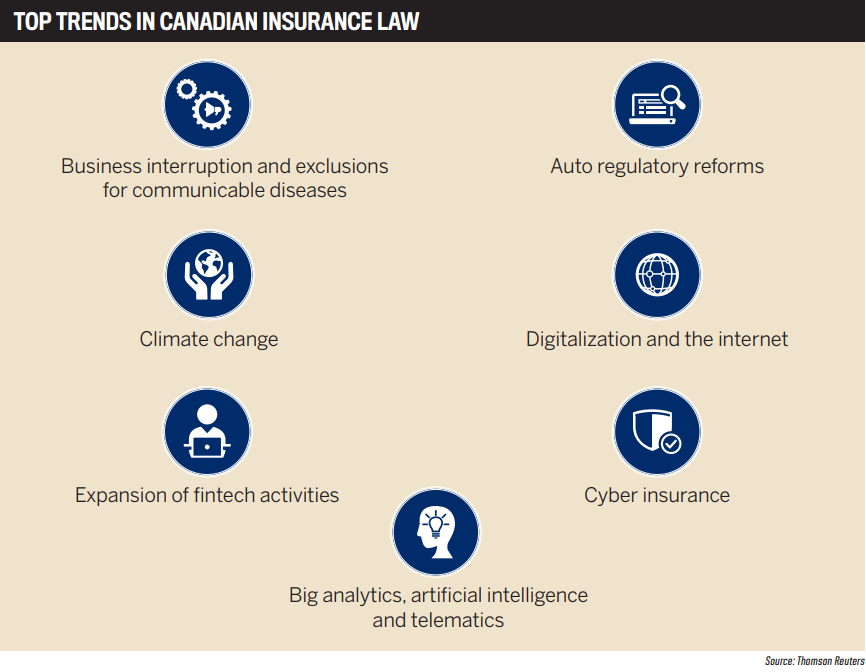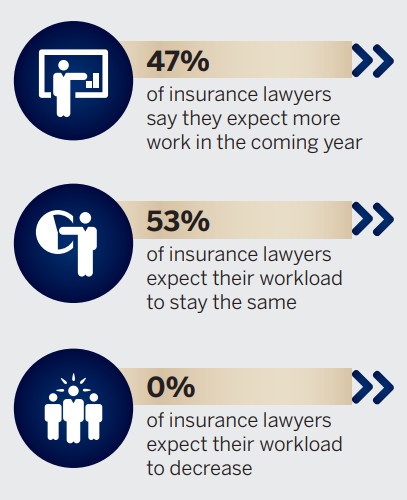
5-Star Insurance Law Firms and Lawyers
Jump to winners | Jump to methodology | View PDF
LEADERS IN INSURANCE LAW
At its most basic, insurance is a contract between two parties. Insurance law determines the creation and enforcement of those contracts and helps manage the buying, selling and claims processes for the industry. Proper legal oversight can smooth out any contractual or other issues that could prove burdensome in the future. With that in mind, IBC surveyed insurance companies to find out which lawyers and law firms are setting the standard in the Canadian market.
“Receiving this award is an acknowledgement to attrition on the part of my competitors and longevity on my part,” says Pasquale Peloso, a partner at Gowling WLG, who was recognized on both an individual and firm level with a 5-Star Award. “After 36 years of practice, we have the advantage of experience in a broad base of insurance-related claims work.”
Daniel Downe, a partner at Field Law, likewise puts his and his firm’s spot among this year’s 5-Star Insurance Law Firms and Lawyers down to expertise. “We have developed a solid team of lawyers who have a passion for the insurance industry that drives us to help clients mobilize and respond to industry changes quickly and effectively,” he says. “Some of our lawyers have previously worked in-house for insurers. Our lawyers draw on this experience to benefit our clients in resolving their disputes in a collaborative, timely and cost-effective manner.”

Confronting COVID
As part of the survey process, IBC asked insurance leaders about the biggest legal issues facing the industry at the moment – and unsurprisingly, COVID-19 came in at the top of the list. Among insurers’ many COVID-related legal concerns are the determination of coverage under specific policy wordings in class action suits, liability claims involving long-term care homes, and municipal liability claims continuing to expand in conjunction with the 1% rule.
Then there’s the impact on law firms themselves – Peloso says the sudden shift to remote work necessitated by the pandemic has affected all litigation steps and will likely result in a hybrid means of litigation going forward.
“The most significant change in our area over the last two years has been the implications on our practices as a result of the COVID pandemic,” he says. “The consequence for practitioners has been one whereby there has been an acceleration and perhaps a permanent adoption of remote and electronic practices.”
Downe agrees that “the past year has been one of uncertainty for the industry as to how long the effects of the pandemic will continue and ongoing restrictions that prevent in-person attendances at questions and mediations. A majority of legal steps are being done remotely, limiting the interaction for all parties involved in a dispute.”
In addition to causing procedural problems and a backlog in court cases, Peloso notes that the pandemic has also caused some underwriters to withdraw liability coverage from policyholders.
As for the long-term effects of COVID-19 on insurance law, much is still to be determined at this point.
“[There are] still outstanding issues with respect to coverage for personal injury and property damage from the pandemic,” said one respondent to IBC’s survey. “Existing class actions are not done yet, and certain workings are not legally considered.”
Another respondent pointed out that the 1% rule could lead to “potential solvency issues, depending on the results of the COVID coverage litigation.”
However, respondents also acknowledged the industry’s efforts to proactively address the dilemma of pandemics. “COVID-19 will be less of an issue because inclusions are being written into the insurance premiums,” said one survey participant, although they added that issues could still arise in future pandemics from anything that might fall outside these inclusions.
Other emerging issues
Beyond COVID, climate change and cybersecurity were also hot topics that survey participants felt were likely to dominate the field of insurance law for the foreseeable future. In terms of climate change, respondents pointed to everything from increasing property damage to a rise in catastrophe coverage as emerging trends.
“Climate change will bring important claims, and also for those in the liability market, the collective action or class actions are something that they will have to consider because there’s a lot to place,” one respondent said.
Downe agrees that climate change presents a particular danger for the insurance industry. “In my view, we are seeing the effects of climate change with many more weather-related events, which are causing damage to homes, land and businesses,” he says. “These claims result in tremendous losses and will change how insurers decide to cover those events, if at all, and determine the premiums associated with covering individuals and business in higher-risk areas.”
As for cybersecurity, respondents noted that rising cyber losses and evolving cybercrime techniques present an ongoing challenge. One survey participant also pointed out that the cyber insurance industry is “still [having] growing pains … as claims start to come in. The insurers have become much more confident in underwriting because there have been coverage decisions with cyber coverage, but it’s still developing.”
Peloso is also concerned about how cyber-security will play out in law firms’ daily operations as more processes remain remote. “It will be interesting to see with the move towards having lawyers practice remotely, rather than collectively in office spaces, whether this practice will result in additional cybersecurity risk,” he says.
Another of the biggest legal issues right now, Downe says, is the discussion at the provincial level about moving to a no-fault or modified no-fault scheme. Other key areas of concern on the radar of survey participants include opioid addiction claims, tort reform, defence cuts, condominium insurance and the size of judgments in injury cases.

The way forward
Looking ahead, Peloso says educating young lawyers will be key to helping insurance tackle some of these pressing challenges.
“From my perspective, success in doing a defence practice requires a number of components, not the least important of which is good mentoring,” he says. “The area can be quite complex at times, and young counsel, particularly in the early years of practice, require an opportunity to learn from experienced practitioners.”
For Downe, being prepared to meet future challenges is all about expertise and adaptation. “The insurance lawyers and law firms best positioned for the future will be those who can offer a broad range of experience while also adapting to provide services in new and emerging areas,” he says. “Finally, lawyers will need to evolve their skill set to recognize issues and develop a creative plan to resolve them without always following the same legal steps towards trial.”
Insurance Law Firms
- Adair Goldblatt Bieber
- Alexander Holburn
- Blake, Cassels & Graydon
- Blaney McMurtry
- Borden Ladner Gervais
- Clyde & Co Canada
- Dutton Brock
- Fasken
- Field Law
- Gowling WLG, Ottawa office
- Kelly Santini
- Lenczner Slaght
- Lerners
- McCague Borlack
- McCarthy Tétrault
- Owen Bird
- Stieber Berlach
- Torys
Insurance Lawyers
- Andrea Lim
Partner, Dutton Brock - Bruno De Vita
Partner, Alexander Holburn - C. Kirk Boggs
Partner, Lerners - Daniel Downe
Partner, Field Law - David Corrigan
Partner, HMC Lawyers - Gord McGuire
Partner, Adair Goldblatt Bieber - Gregory Tucker
Barrister and Solicitor, Owen Bird - Howard Borlack
Managing Partner, McCague Borlack - Jean-Pierre Casavant
Avocat, Associé Lawyer, Partner, Casavant Bedard - Jill E. McCutcheon
Partner, Torys - Koker Christensen
Partner, Fasken - Nancy J. Carroll
Partner, McCarthy Tétrault - Pasquale Peloso
Partner, Gowling WLG - Paul Belanger
Partner, Blake, Cassels & Graydon - Philippa Samworth
Partner, Dutton Brock
Methodology
To determine the best lawyers and law firms catering to the insurance industry, Insurance Business Canada sourced feedback from insurance leaders over a period of 15 weeks. IBC’s research team began by conducting a survey with a wide range of insurance companies to determine what insurers value in the law firms they collaborate with. The in-depth information gleaned from this survey enabled the research team to assign weighted values to the services law firms offer to their insurance industry clients.
The research team also spoke to hundreds of insurance professionals across the country by phone, asking them to rate the insurance law firms and lawyers they had worked with over the previous 12 months. In addition, the team sought the opinions of insurance lawyers themselves to find out which law firms they would recommend besides their own. At the end of the research period, the law firms and lawyers that received the highest rankings in terms of work quality, specialist expertise and client service were declared 5-Star Award winners in the field of insurance law.

Keep up with the latest news and events
Join our mailing list, it’s free!
